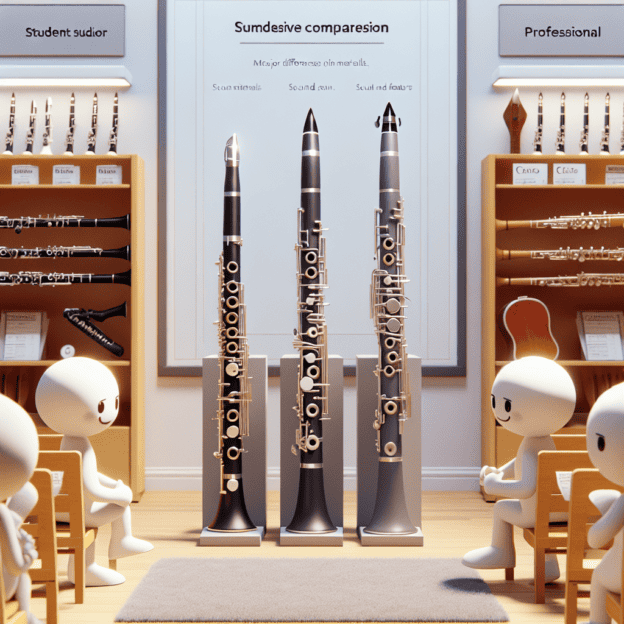Selecting the ideal clarinet is a crucial choice for musicians at any stage of their career, from beginners to experienced professionals. Clarinets are generally divided into two main categories: student models and professional instruments. Each type has its own set of features, advantages, and drawbacks that cater to players of varying skill levels. This guide explores the key differences between professional and student clarinets to help you make an informed decision.
Understanding the Basics
Student clarinets are entry-level instruments designed for beginners. They're built to be durable and reliable, capable of withstanding the rigors of learning and practice. Professional clarinets, on the other hand, are crafted with precision for advanced players. These instruments are made to meet the exacting standards of performance settings and produce the specific tonal qualities that professional musicians need.
Material Quality
The materials used in constructing clarinets significantly influence their performance and durability:
- Wood vs. Plastic: Student clarinets are typically made from plastic, which is resilient and resistant to environmental changes. This makes them perfect for beginners who might not handle their instruments carefully. Professional clarinets are usually crafted from fine-grain wood, like grenadilla, which produces a warmer, richer tone. Wood also offers experienced players the subtle tonal variations they seek.
- Key Mechanisms: Student models feature simpler mechanisms with more basic metals, suitable for beginners. Professional clarinets boast precision-engineered key systems that offer superior responsiveness and feel, essential for advanced playing techniques.
| Feature | Student Clarinet | Professional Clarinet |
|---|---|---|
| Material | Plastic | Fine-grain wood (e.g., grenadilla) |
| Key Mechanism | Simple, basic metals | Precision-engineered, high-quality metals |
| Durability | High | Moderate (requires careful handling) |
| Sound Quality | Good for beginners | Superior, rich, and nuanced |
Sound Quality and Tone
Sound quality is a key factor that draws many musicians to professional clarinets:
- Timbre: Professional clarinets produce a richer timbre with more complex tones, perfect for solo performances and orchestral work. Student clarinets often have a simpler sound, particularly in higher registers.
- Projection: A clarinet's ability to project sound clearly across a large space is essential for performances. Professional clarinets excel in this area, offering greater volume and clarity over longer distances.
Functionality and Features
The capabilities of student and professional clarinets differ in several key areas:
- Ease of Play: Student models are designed with user-friendliness in mind, featuring simplified key layouts to help beginners learn. Professional models, while still playable, are built for advanced techniques and may be more challenging for new players.
- Customization: Professional clarinets allow for precise tuning and can be adjusted to suit a player's specific technique and style. This includes customizing the ligature, barrel, and reed choices.
Pricing and Value
The cost is often a decisive factor when choosing a clarinet:
- Price Range: Student clarinets are considerably more affordable, typically priced between $200 and $800. This makes them an excellent choice for beginners. Professional clarinets can cost anywhere from $2,000 to over $10,000, reflecting their superior craftsmanship and materials.
- Long-term Investment: While student instruments are less expensive initially, many players find that upgrading to a professional clarinet offers better sound quality, longevity, and overall satisfaction, making it a worthwhile investment in their musical development.
When to Upgrade?
Knowing when to transition from a student to a professional clarinet is a common question among players:
- Skill Advancement: Consider investing in a professional clarinet if you're committed to improving your skills, tackling more difficult pieces, or performing in ensembles beyond school.
- Tonal Preferences: Musicians interested in professional solo work, chamber music, or performances in larger venues might need a professional instrument to achieve their desired sound quality and tone.
The Martin Freres Advantage
When discussing clarinets, it's worth mentioning the Martin Freres brand. Renowned for its commitment to quality craftsmanship and excellent sound, a Martin Freres clarinet combines artistry and innovation. Whether you're a beginner or an experienced professional, a Martin Freres clarinet can significantly improve your playing experience.
As you explore your options, carefully consider all factors to choose a clarinet that aligns with your current skill level, future goals, and musical aspirations.
Table of Contents
- Understanding the Basics
- Material Quality
- Sound Quality and Tone
- Functionality and Features
- Pricing and Value
- When to Upgrade?
- The Martin Freres Advantage







